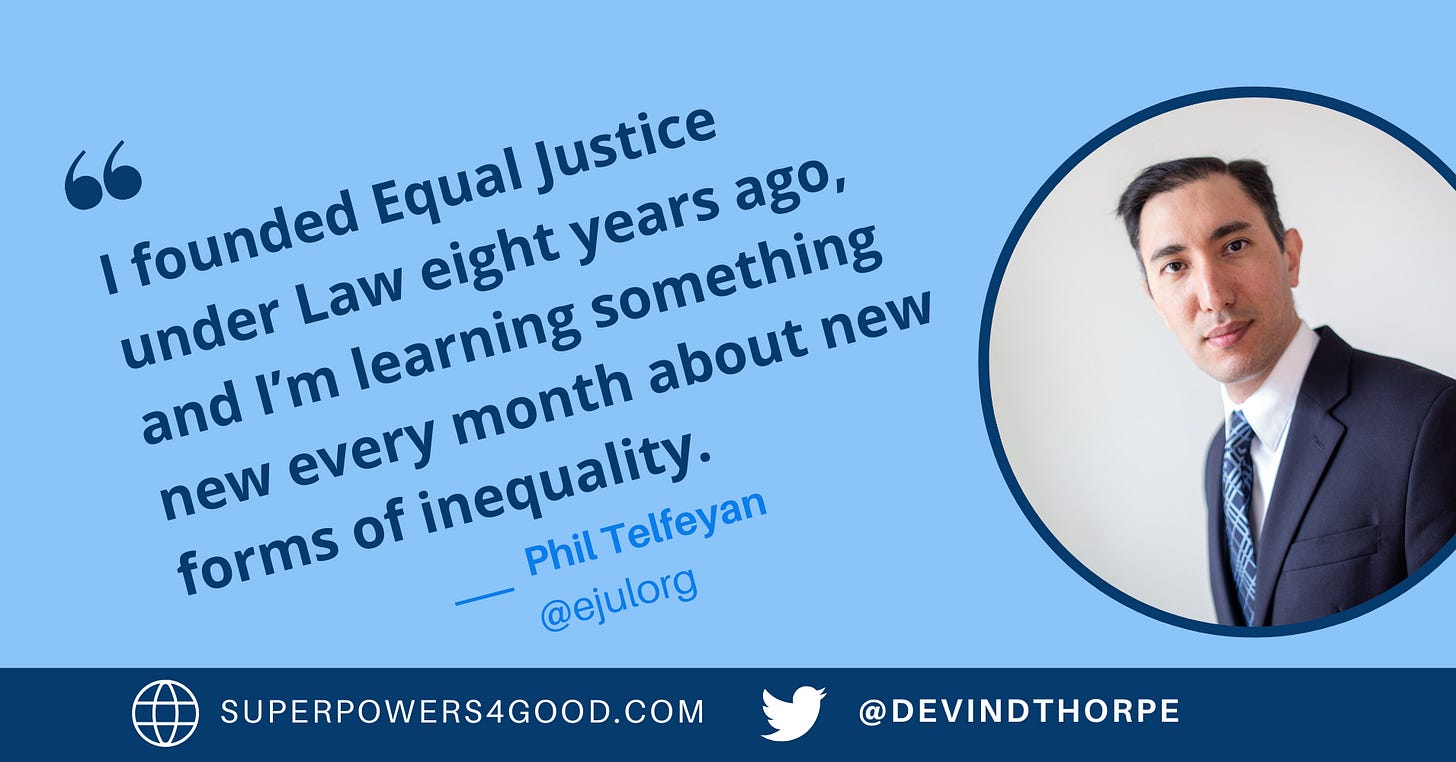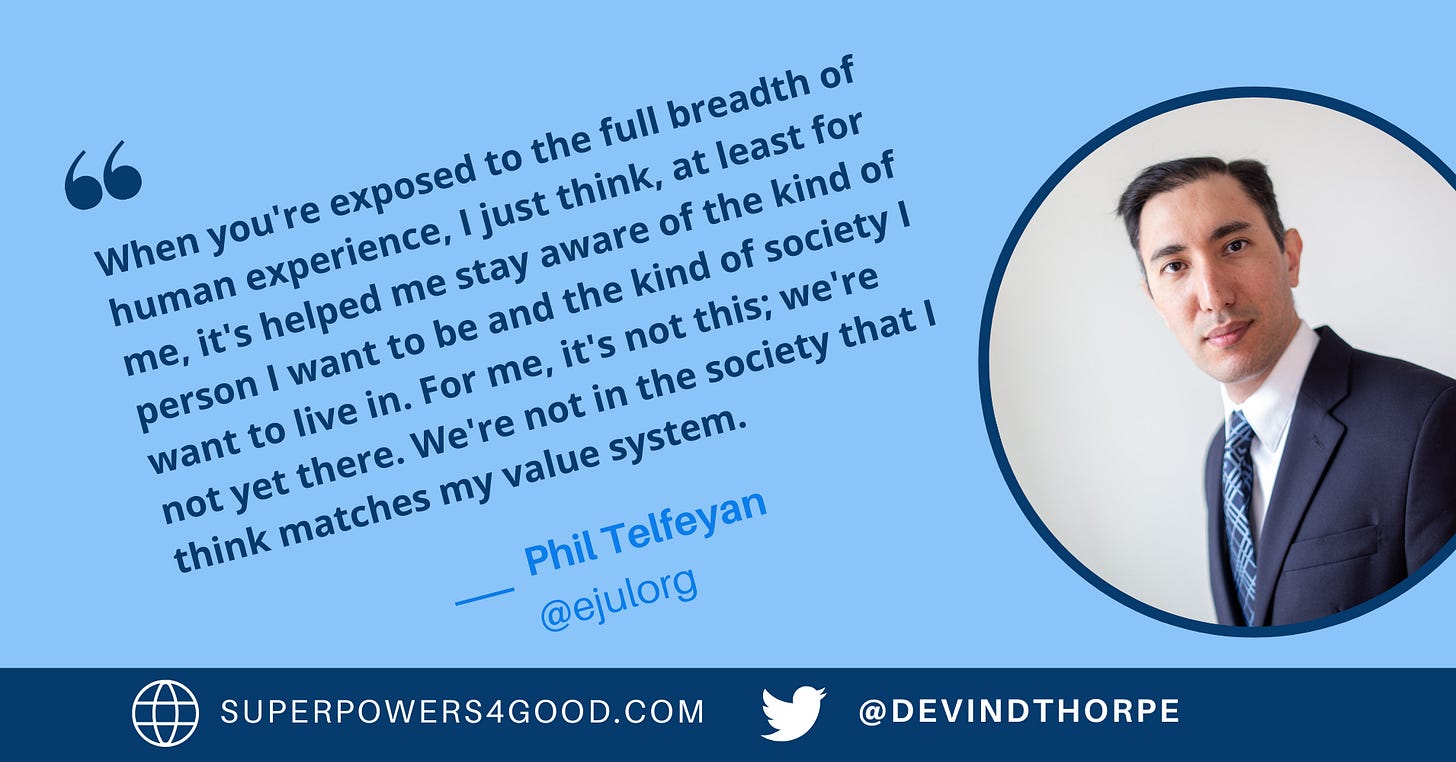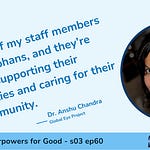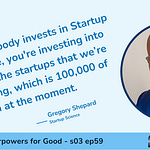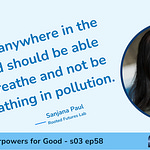Devin: What is your superpower?
Phil: I didn’t see homelessness, at least in person, and I didn’t see that extreme wealth.
I went to Harvard for college, where I saw both for the first time as an 18-year-old, and both were equally shocking to me. I saw this tremendous wealth. I had classmates whose last names were the same as the buildings where I was going to class because their parents or grandparents had donated to Harvard University and gotten the building named after them. One of my classmates was a movie star, Natalie Portman. Another was the son of a vice president, Al Gore. Al Gore Junior was one of my classmates. So you saw this immense wealth. And at the same time, I’m in Cambridge, Massachusetts, where there are people sleeping on the sidewalk, which I had not seen.
So I get to Cambridge, Massachusetts, and I see both ends. And I’ll tell you, Devin, that tragedy has stuck with me. Twenty years later, I still feel—how can we live in a country that allows this kind of inequality? It doesn’t feel right to me. You know, I don’t have a grand philosophy on it. It’s more of an emotional reaction. I still feel that pain. What do we think of each other, that we would literally let someone starve to death in a gutter because we haven’t figured out a way to take care of each other? That pain is a lot of what motivates me.
Injustice in the criminal justice system is hiding in plain sight. Phil Telfeyan says, “I founded Equal Justice under Law eight years ago, and I’m learning something new every month about new forms of inequality.” The nonprofit started the movement to end cash bail. But that was just the beginning.
Phil, I’ll dub him the “capped crusader,” leverages two degrees from Harvard in his crusade. He works for social justice with a passion that astounds me.
“The justice system should treat people equally. Rich or poor shouldn’t matter in the justice system,” Phil says. But that isn’t how it works. “The system punishes people who are poor and creates cycles of poverty.”
Cash Bail
People arrested for minor crimes are often given shockingly large bail amounts—tens of thousands of dollars is not unusual.
“If you can afford that $30,000, you walk out right at that moment,” Phil says. “If you can’t, you’re going to stay in jail for weeks, months or maybe years pending trial if you’re fighting your case.” That stay is all before conviction.
The difference matters.
“Those who have money can buy their way out of jail and have all the advantages,” he says. “That includes they can keep their job. They can prepare for their defense. They can maintain their family relationships. They can stay in their housing, etc.”
Equal Justice Under Law serves clients who can’t afford lawyers; all its work is pro bono.
Phil explains how life is different for his clients:
Our clients can't afford a $30,000 bail, so they're stuck in jail. So all of the opposite happens. They can't prepare for their defense. One of our clients was a single parent. Those children are being taken into protective services right now; they're wards of the state. So, it's destroying family relationships. You're probably losing your job if you're in jail for even a couple of days, particularly low paying jobs. They don't have a lot of flexibility if you've missed work. If you miss a rent payment, your housing now is maybe pulled from under you.
Surprisingly, prosecutors don’t charge many of his clients. “Most of the people we represent end up not even being convicted of anything,” he says. “The example I gave you of the person who was accused of shoplifting and got $30,000 in bail, her charges were dropped. She was never prosecuted.”
“She spent several days in jail because she couldn’t afford the $30,000,” Phil says. “She lost her job and other consequences but was never even charged with a crime. Never convicted; has no criminal record.”
Phil is notching victories on this front. “we have filed 12 lawsuits on this issue, and we have had tremendous success. We have won every single one of those lawsuits, either through settlement or court order.”
Driver’s License Suspensions for Unpaid Court Debt
“Hundreds of thousands of people in this country have a suspended driver’s license, even though they’re good drivers, solely because of unpaid court debt,” Phil says. “They may never have had a traffic infraction in their life.”
He shared a story to illustrate the problem:
We had a client with $150 fine—$150 to a lot of people, doesn't sound like a ton of money. But for our client, her name was Adrian, $150 was a lot of money. She was a single parent. She was working full-time job, but living paycheck to paycheck.
This is not someone who is saving money because every single dollar that comes in needs to go out for a necessary expense for herself or her children. So it's and it's not on frivolous things. It's rent, it's clothing, it's food, it's school supplies, right?
So when every dollar that's coming in is going to an expense, you don't save $150, it takes indefinite. You're never going to save—even at a dollar a month, it's going to take forever.
So, she didn't have $150 and she lost her driver's license as a result. Well, I think people can understand what's going to happen once you lose your driver's license in 80 percent of cases. The next thing that happens is you lose your job.
I mean, just think of the city you live in. There's very few towns in the United States where public transportation can reliably get you to work on time and you're working a low wage job and you're late once or twice, you're probably fired.
So that cycle just downward spirals. You lost your license, then you lost your job. And a lot of states that debt that caused you to lose your license compounds. And so after a few months, it's doubled and quadrupled and multiplied. And so your debt only grows and you've never been able to pay it back, all for some petty infraction, for some minor thing that wasn't even a crime.
A notable example he found was someone fined for not mowing the lawn.
Phil points out that his clients and others like them want to pay their debts—they just can’t afford to. “To punish someone who wants to pay but can’t afford to only creates more problems,” Phil says.
“When we talk about someone being stuck in jail, even though they haven’t been convicted of a crime or someone losing their driver’s license, even though they’re a great driver, that’s a bad thing, not just for our clients, but for the city, for the state, for the community,” he says. “If someone’s losing their job, if someone can’t take care of their kids, nobody’s benefiting from that.”
Criminal Record Expungement
“Every state allows you to expunge an old criminal record,” Phil says. “Usually, there’s about a ten-year waiting period, and if it’s a minor conviction, they’ll expunge it.”
“But a lot of states will charge fees to get that expungement, sort of filing fees, paperwork fees,” he says. “We filed a lawsuit in Louisiana where the fee to get a record expunged is $550.”
His client is the perfect example of the problem. “We have a client; he’s a server at a restaurant waiting tables, making very low income, has two convictions and two arrests,” he says. “All of them are over 15 years old. For those four events multiplied by $550, it costs $2,200 for an expungement of four very minor, very old convictions.”
Discrimination against formerly incarcerated people is often legal in housing and employment, meaning that the expungement can have significant upside benefits. Without the expungement, many will never be able to afford to have their records expunged.
Voting Right Restoration
“In most states, when you get convicted of a felony, you lose the right to vote,” Phil says. “Once you get out of prison, you’re eligible to vote again.”
As with expungement, there is a complication.
“In a lot of places, you have to pay fees, essentially processing fees, but they can amount to hundreds of dollars to file paperwork to get the right to vote back,” he says. “It’s an insane system. One thing that’s happening, which is extremely—it’s the dark side of this, is it tends to be race-based. Tennessee, the state we’re suing, has the highest percentage of disenfranchisement of African American voters.”
Privatization and Fees for Pretrial Supervision
“More and more aspects of what we think of as justice are now for sale,” Phil says. “It’s going to the highest bidder. Private companies are taking over different components of our justice system, and the most common people have heard about private prisons. That’s a big one. And abuses tend to run rampant.”
“We’re seeing it more and more when it comes to pretrial supervision and probation after trial,” he says. “Private companies are moving into these spaces now.”
“What we’ve seen when it comes to a justice system and the concept of justice is that private companies tend not to put justice first,” he says. “They tend to have other priorities.”
Phil adds, “I’m not saying it’s surprising, but when you have that profit motive instead of that justice motive, constitutional rights tend to get violated.”
“What we see is extortion,” he says. “We see people who are reporting for probation. Instead of getting support from a probation officer, they’re getting threatened by their probation officer and not, ‘Oh, you’ve got to follow the law. You’ve got to straighten up.’”
“Sure, probation officers often want to get people in line to follow the law,” he says. “But when it’s a private company, the threats are you have to pay us more money, or I’ll send you to jail.”
“A lot of people don’t have that money. Their friends and family don’t. So, they’re ending up in jail because a private company is threatening them with jail because the private company wants to make money,” Phil says. “This is happening all over the country.”
Each new injustice Phil discovers fires his passion. His superpower is the pain he feels witnessing injustice.
How to Develop Pain As a Superpower
Phil shared a story to help explain the pain he feels and how it motivates him:
Of course, Boston people know it's notoriously cold winters. You know, people who live on the streets die every winter in Boston because of the cold temperature, hypothermia, frostbite and things like that.
I was very lucky in a volunteer capacity to become a director of a homeless shelter before I went to law school and got to see firsthand what do we offer. And it's sadly very little.
Our society relies on nonprofits and a lot of volunteerism to take care of each other. It wasn't really government support. We were not a government shelter. It was a small shelter, 24 guests per night. But even then, you form relationships with people.
One of our guests died a very memorable, still sad, sad experience for me. You just see how hard it is to make it.
Another thing I saw which which I didn't know. A lot of people don't know because of stereotypes, 60 percent of the homeless population in Boston, at least when I was in the shelters in there, 60 percent have full-time jobs, which surprises a lot of people.
“Oh, well, they just sat on the sidewalk with a cup. Right. Asking for money.”
That's not true for most people. Most people are hard-working. There's still a lot of discrimination in the society. A lot of it's race-based; a lot of it is based on economics.
If you don't have a home address, if you're giving someone the address of a homeless shelter when you're applying for a job, they're very unlikely to call you back for that interview.
Seeing the worst effects of social injustice alongside tremendous wealth defined Phil’s mission in life.
“I want to live in a society that is more humane. I try to live that myself. You know, I live in a big city,” Phil says. “There are people who do ask for money on the sidewalk. I make it a point in my personal life to say hello to every single person who talks to me, to give every single person who’s asking for money a dollar, which is not a lot of money.”
“A dollar doesn’t do much, but it’s at least that effort of human dignity. It’s like, I’m not just going to walk by and ignore that someone is asking something,” he says. “I can at least respond and give what I can.”
“I think if our society did that, we’d see better outcomes again, not just for certain people but for everyone,” Phil says. “I think everyone would benefit if we had a more equal society.”
Phil learned an important lesson from his friends in the homeless community:
I was at Harvard for college and law school is this elite institution. And yet the hardest working people I knew weren't my classmates. They weren't these people who were going to Wall Street making literally seven figures a year in salary.
They were some of the guests at our homeless shelter. These are sometimes people working multiple jobs—and hard work—manual labor and cleaning and dirty work. It wasn't sitting at a desk crunching numbers.
I just saw some of the hardest working people. I still do. Now, even though I'm a civil rights lawyer by day, I try to dedicate my evenings and weekends as much as I can to stay in touch with the community.
So, I volunteer at a food kitchen. I help run a mentoring program helping local public high school students. I volunteer with people recovering from mental health disabilities, and I don't say this as a sacrifice.
When you're exposed to the full breadth of human experience, I just think, at least for me, it's helped me stay aware of the kind of person I want to be and the kind of society I want to live in. For me, it's not this; we're not yet there. We're not in the society that I think matches my value system.
Phil offers some surprising advice for leveraging a commitment to social justice from the pain he feels: Budget.
I encourage people to think about their personal budget before they start making the big bucks or small bucks, you know, if you go a nonprofit. Whatever path it is, how much money do you need?
And I don't even say shortchange yourself, but just think about what do you need for housing? What do you need for food? What do you need for clothing? I set that budget in law school and I created a maximum income for myself. I just said, Here's how much I need.
I thought about one day I'll have maybe kids of my own. I want to save for their education, whatever. Whatever it is. I'm not going to be judgmental about what's in your budget, but actually create it.
And I set it and I have not changed my maximum income in the 14 years since I've been working. My salary, by the way, surpassed that income two or three years into working. Even though I've been a public interest lawyer the whole career, it passed my needs and I've donated every dollar I've made above that to charity the whole time.
I haven't changed my income. I haven't thought, oh, well, I need now that I'm making more, maybe I should expand things I haven't needed to.
So, when you think about your budget and what you need, instead of just spending the money that comes in, spend what you need and be generous to yourself for sure. But if you make more than that, maybe there are some causes that you want to donate to, or some charities or nonprofits that you'd like to support. I found that money goes a long way.
By following Phil’s example and counsel, you can make pain your superpower for good.




